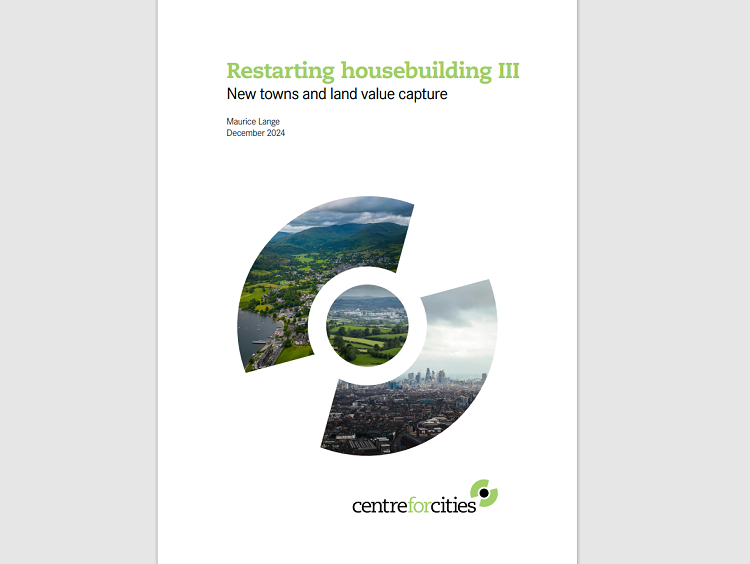A large increase in housebuilding could net £6.4 billion per year to fund infrastructure and community facilities – such as public transport, social housing and schools – if Government secures a share of “windfall” increases in land values for the public purse, Centre for Cities says.
In Restarting housebuilding III: New towns and land value capture, Centre for Cities estimates that a total of £193 billion could be generated over a 30-year period if the Government combines increases in housebuilding with more effective tools for capturing and reinvesting the revenues from the development.
If split between funding affordable housing and transport upgrades, for example, the annual amount could cross-subsidise the building of 18,500 social homes and 50 miles of new tram lines every year.

Capturing the uplift in value requires Government to be bold in tackling the related challenges of green belt reform and land pricing.
Centre for Cities identifies land with space for up to 5 million homes within commuting distance of 15 major UK cities but nearly two-thirds of the land is in the green belt, meaning Government must tackle green belt reform and other measures to release this land for development within the planning system.
Around London – where the opportunity to raise money for public investment is the greatest – 88 per cent of the land identified as suitable for urban extensions is in the green belt. This land represents just 7 per cent of London’s green belt; the total green belt area across England and Scotland would shrink by less than five per cent if all viable locations were developed.
And Government must also take a bold approach to land pricing, setting a price to buy the land that is low enough to capture the market uplift that can be invested in the infrastructure that new homes will need, but high enough to encourage landowners to sell.
To capture the full estimated potential uplift in land values, Centre for Cities estimates that public authorities – including New Town Development Corporations – would need to acquire the land at five times the agricultural value. Such an approach has the potential to realise large value surpluses from the areas around London and Cambridge, as well as smaller surpluses in areas around Oxford, Birmingham, Brighton, Bristol and Bournemouth.
Andrew Carter, Chief Executive of Centre for Cities, said: “Government has recognised growing our big cities is important for national growth. But that growth is held back by planning policy, particularly the green belt.
“These figures should encourage the Government to be bold. The country stands to benefit hugely from a programme of urban expansions in and around our big cities.
“One of the benefits of the bold approach we recommend will be that a significant amount of the new housing and related infrastructure could be funded from increases in land values.”




















